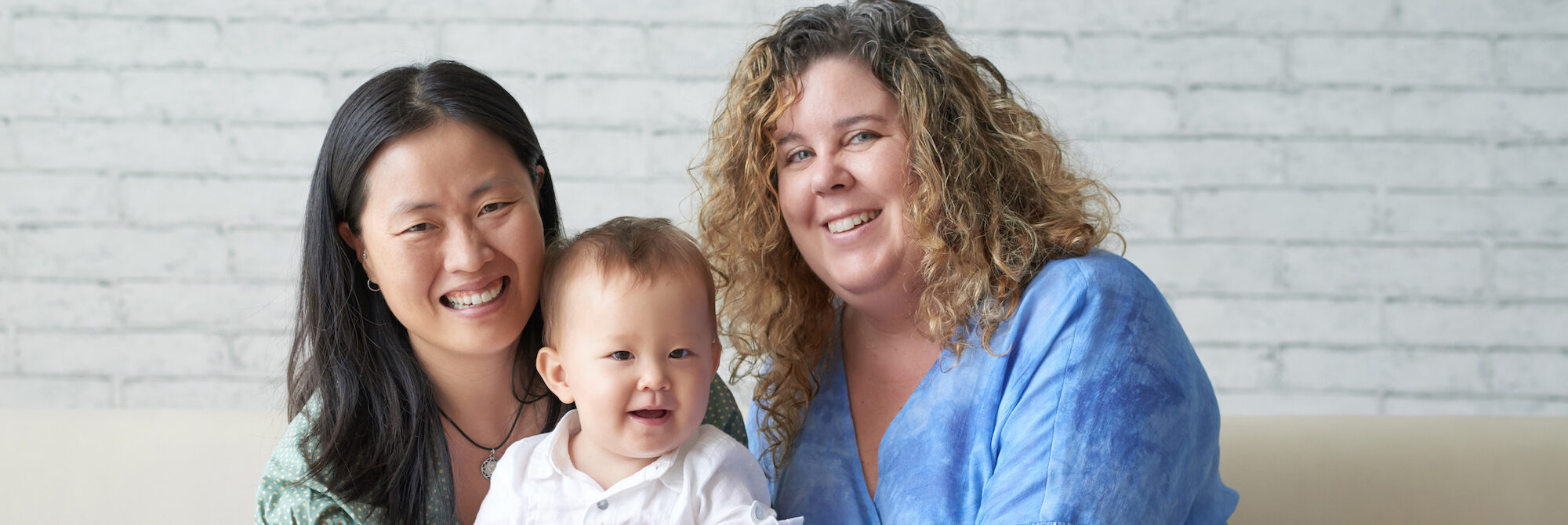Reciprocal IVF for Lesbian Couples
Reciprocal IVF at a glance
- Reciprocal in vitro fertilization (IVF) for lesbians allows both women to participate in the pregnancy.
- One woman supplies her eggs, retrieved and fertilized by donated sperm in IVF, with the resulting embryo(s) implanted into her partner for pregnancy as a gestational carrier.
- This presents an opportunity for the couple to choose which partner donates the eggs and is the biological mother, and which carries the pregnancy.
- Risks of reciprocal IVF are the same as for regular IVF, though it involves medical procedures for both females as opposed to one woman as in regular IVF.
- Reciprocal IVF involves considerable legal and emotional issues, and we recommend lesbian couples obtain appropriate legal and emotional counseling beforehand.
Reciprocal IVF for lesbian couples
Reciprocal IVF for lesbian couples is when one woman donates her eggs for fertilization and her partner carries the pregnancy. Most of the processes are consistent with any IVF procedure: ovulation induction, egg retrieval, egg fertilization and embryo transfer. The woman who supplies the eggs that become an embryo will be biologically related to the child, and the woman who carries the pregnancy will not be genetically related to the baby.
Lesbian couples can go through egg stimulation/retrieval and embryo transfer during the same cycle. They can also freeze the retrieved eggs for later fertilization and transfer, or go right to fertilization after egg retrieval and freeze a resulting embryo for future transfer.
Other candidates for reciprocal IVF include women who can produce healthy eggs but need another woman to act as their gestational carrier or vice versa. Trans men who froze eggs prior to undergoing their transition are also good candidates.
Benefits of reciprocal IVF for lesbian couples
The biggest benefit of reciprocal IVF for lesbian couples is to enrich their experience building a family. It gives each woman the opportunity to contribute to the conception and birth of the couple’s child.
Lesbian couples have undergone dual reciprocal IVF at the same time, so each woman carried her partner’s child simultaneously. Other couples have undergone the entire process once and then reversed roles to have a second child.
RadioMD “Fertility Talk” Podcasts
Dr. William Ziegler discusses the treatment options for same sex female partners who want to have a baby.
Reciprocal IVFHow the process works
Both partners receive health screenings to determine overall health and assess fertility factors. For some couples, the decision about who donates the eggs and who carries the pregnancy is not an obvious one. Age, reproductive health and other aspects of an individual’s medical history contribute to the success or failure of IVF and the likelihood of a healthy birth. Our fertility specialists work with each couple to evaluate and address such medical issues, as well as the desires of the couple.
Egg retrieval & synchronizing cycles
In reciprocal IVF, eggs are retrieved from the donor through the same process as in a conventional IVF. Various hormone-based drugs are used to grow multiple eggs simultaneously in the ovaries. Our physician retrieves the eggs out of the donating parent’s ovaries using a special needle, guided by a vaginal ultrasound.
In a fresh reciprocal IVF cycle, both partners take medications to synchronize their menstrual cycles. When the women’s menstrual cycles are synchronized, the transition from egg donation to fertilization to embryo implantation can happen within a matter of days. Using frozen eggs or embryos as described above allows for greater flexibility in initiating the transfer.
Fertilization
Donated sperm is used to fertilize the donated eggs in the IVF process. The couple can choose an anonymous donor, a friend or a family member to donate sperm. Using high-quality sperm without inherent fertility or motility problems increases the likelihood of success.
The fertilized eggs, or embryos, are cultured in the laboratory until they develop to the blastocyst stage, which is usually five days after fertilization. Using embryos at this stage reduces the risk of multiple births while also increasing the odds of a successful pregnancy.
PGT & implantation
At this point, the lesbian couple can utilize preimplantation genetic testing (PGT) in reciprocal IVF. This tests the embryo(s) for the correct number of chromosomes, which maximizes implantation, decreases miscarriage and minimizes the risk of a child with a genetic mutation. Only a genetically healthy embryo(s) will be implanted for pregnancy.
Whether or not PGT is utilized, in most cases, the embryo is transferred to the recipient’s uterus through the cervix via a soft catheter. The procedure does not usually require anesthesia.
Risks and other considerations of reciprocal IVF
The health risks of reciprocal IVF are similar to those of conventional IVF. Medications used to mature eggs for harvesting can cause ovarian hyperstimulation syndrome (OHSS) and other temporary side effects in some women, secondarily to increasing hormone levels and maturation of multiple eggs.
Lesbian couples should consider the legal rights their state grants them with regard to children and their partner’s medical care. For example, the woman who donates the egg may need to legally adopt her biological child in order to have the same parental rights as the woman who carries the pregnancy. Death or divorce also bring legal issues for parents.
An attorney experienced in IVF law in the couple’s state of residence, especially as it concerns same-sex couples, can help guide the conversation and establish legal agreements that protect both the parents and children.


